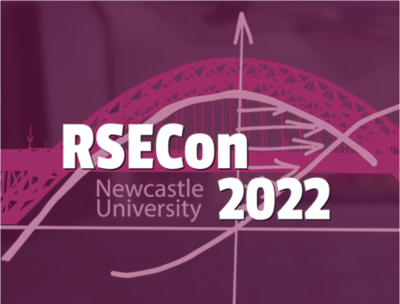My first RSECon as a Research Software Engineer
Posted on 1 December 2022
My first RSECon as a Research Software Engineer
 By Edward Parkinson, University of Southampton.
By Edward Parkinson, University of Southampton.
This year’s RSECon in Newcastle (6th-8th September 2022) was my first time attending RSECon as an RSE. The reason why I say “as a Research Software Engineer,” is because way back in 2019, whilst I was still an astronomy PhD student, I managed to convince my supervisor that I should attend RSECon, because, hey, this might be a future career path for me – and it actually became my career path at the end of last year. So while this year’s conference wasn’t my first rodeo, I did find that attending at different career stages did create a different experience, and it made it feel like it was my first RSECon.
What is RSECon?
For anyone who isn’t familiar with RSECon, I’ll give a brief rundown on what’s what. RSECon is a conference organised by the Society of Research Software Engineers. The first RSECon happened in 2016 and has become an annual event since; well if you pretend the COVID-19 pandemic didn’t happen, at least. RSEs, software engineers and researchers from all across the UK, and sometimes even further afield, come together to participate in talks and workshops, covering the nitty-gritty technical parts of research software engineering and also the more community and people-focused aspect of the occupation.
Each day of the conference ended with a social event. At past conferences, I’ve found it difficult to figure out where to eat or what to do on an evening when there are no organised events and the conference isn’t somewhere familiar. I really think having something to do every night was a really great idea, and it really helped me to fit in trying to network with everyone. The social events were not compromised by quantity. The venues and food were excellent, and the relaxed atmosphere made it easy for a newbie like me to start putting names to faces, and to get to know some of the RSEs in my local area. Networking hasn’t been something that has ever come naturally, and it wasn’t something I really did as a Ph.D. student visiting RSEcon. I did manage to change that this year though. The relaxed atmosphere of the socials made it easy to mingle and to (finally) meet some of the names my colleagues mention.
Talks and workshops
Before becoming a full-time RSE, my main software interests were using HPC and Artificial Intelligence for my research. Not much has changed since I became an RSE, so I mostly stuck to the sessions related to these topics. But I also sprinkled in a few sessions related to software development practices. I haven’t had many opportunities to attend talks or workshops on this topic before, so I was hoping that I might pick up a few things and start to feel more at home in my new RSE role.
I attended both the AI/ML and the software development sessions on the first day. One talk which stood out to me was “Should Research Software Only Be Built for Researchers?” by Abhishek Dutta and Prasanna Sridhar from the University of Oxford. Their talk focused on how they built computer vision tools for a wide audience, rather than for a small group of experts. The feedback from external users forced them to constantly iterate on their design, resulting in a simple to use tool which saw wide adoption outside of just a few expert users at their institution. This talk stood out to me as it’s something I want to try to do now that I’m an RSE, as using “expert-only” tools drove me insane as a postgraduate. Why couldn’t they be designed for a wider audience?
I stuck with my roots, and went to the GPU performance and large-scale computing sessions which were on the final day of the conference. I paid particular attention to Chris Wood’s talk on using containers in HPC research. I spent a lot of time helping people install the research software I used in my PhD, so being clearly shown the benefits of containers for reproducible software in the HPC space really captured my attention and made me think about how I could make the lives of so many researchers easier by using containers, instead of showing them how to navigate a convoluted build process.
Making a difference
Talks like Chris’ and Abhiskehs' and Prasanna’s are what I like about RSECon. They really illustrate the point about why I wanted to become an RSE, to help researchers who rely on software but don’t necessarily have the skills to maintain or create what they want. It really helped to drive home the fact that this was something I can finally care about and help with, and to start making a meaningful difference in research software. Talks like this were completely novel to me, coming from a background where conferences really only cared about new results and not about the reproducibility of their results or the health of their software. So, all in all, I’m glad I got the opportunity to attend (my first) RSECon (as an RSE), and will definitely be going next year!
